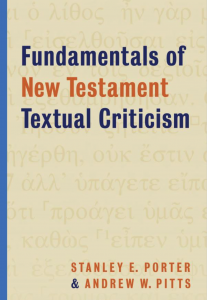Fundamentals of New Testament Textual Criticism
Porter, Stanley E. and Andrew W. Pitts.
Grand Rapids, MI: Eerdmans, 2015. pp. xvi + 202. Paperback.
ISBN: 978-0802872241
The Fundamentals of New Testament Textual Criticism aims to be a “midlevel” introductory book which is somewhat in between the profound Bruce Metzger’s Text of the New Testament and the concise David Alan Black’s New Testament Textual Criticism: A Concise Guide. It seeks to lay a solid foundation in the field for the 1st-2nd year Greek students.
Summary and main points
The book covers the range of traditional topics for textual criticism. For example, it discusses materials and writing styles (ch. 3), major witnesses (ch. 4), the text types (ch. 5), text variants (ch. 6), text-critical methodologies (ch. 7), and the process of weighing evidences (chs. 8-10). In addition, the book provides a discussion on formation of canon (ch. 2) and offers a detailed comparison of UBSGNT4/5 and NA27/28 (ch. 12). Lastly, it overviews the history of English Bible translations which shows the place and the reasons behind each major English Bible (ch. 13).
The authors seem to adhere to the reasoned eclecticism. In short, the witnesses (manuscripts) should not be just counted but weighed. Although, some earlier manuscripts may not be numerous, they are viewed as more valuable. On the other hand, the later manuscripts are numerous but in reality are just copies from medieval copy centers. As a result, it’s not the number but the importance of each evidence that matters.
Personal opinion
I totally enjoyed reading this book. Above all, it has many pros: (a) wide-to-narrow approach. The authors tend to give a bird-view picture of each topic before diving into details. (b) The book’s flow and organization is easy to follow. It is logical and well structured. (c) Each chapter has a list of the most important terms with definitions and suggests good bibliography for further study. Finally, (d) the language and style of writing are easy to understand. This makes the book excellent for those who make first steps into the field of textual criticism.
While the book has many pros, it also has some weaknesses. For instance, some argue that the number of manuscripts on p. 50 is inaccurate (this of course should be verified). In addition, the book would be better if it had colored images of high quality. The readers would appreciate to view the manuscripts.
Moreover, some critics downgrade the book for including topics from outside of the textual criticism (the canon and the history of English Bibles). These chapters, however, play a vital role in the logic of authors’ argument of reasoned eclecticism. If canon was already forming as early as the 2nd century A.D., then the early manuscripts matter. Consequently, it builds up the argument for modern English translations in ch 13. Since KJV is based on the Erasmus’s text (Textus Receptus) made from the late 12-13th century manuscripts, the modern translations which incorporate earlier manuscripts have greater value. According to the authors, the textual criticism theory makes such conclusion plausible.
Conclusion
The book presents a thorough yet simple overview of fundamentals of NT textual criticism. I believe the book will be beneficial not only for seminary students and professors but also for general public who are inclined to academia. The book is excellent for those who have no background in textual criticism and want to start somewhere.
Recommended: Yes
My Rating: 4.5
Check the Amazon Rating
